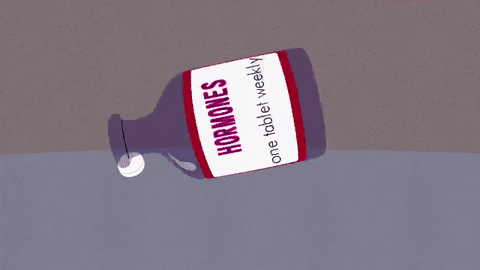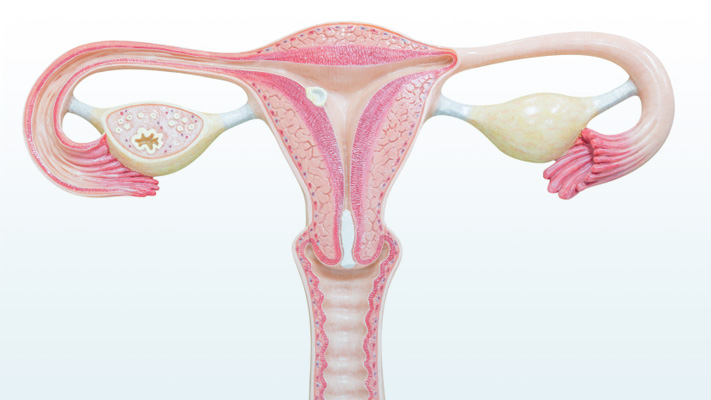Ever skipped your period 2-3 times in a row and then panicked? Well, don’t worry, we’ve got you covered. Signs are that it could actually be Amenorrhea. Before the idea of possibly having Amenorrhea stresses you out, we’ll explain the concept to you in this article and tell you how to fight it too. Additionally, we have answered a few popular questions only for our #NuaWoman Community.
Amenorrhea (uh-men-o-REE-uh) is the absence of menstruation — one or more missed menstrual periods. Women who have missed at least three menstrual periods in a row are known to have amenorrhea. Generally, amenorrhea is divided into two types – primary & secondary amenorrhea.
Primary amenorrhea is the failure of menses to occur by the age of 16 years, in the presence of normal growth and secondary sexual characteristics. Secondary amenorrhea is defined as the cessation of regular menses for three months or more.
This can be attributed to multiple reasons but one of the most common being increased prolactin levels causing failure of ovulation. Amenorrhea is normal for prepubertal, pregnant, and postmenopausal women. However, if the woman is not pregnant or has not attained menopause, then reasons for the same must be checked.

Source: giphy
Other factors that cause amenorrhea include:
Amenorrhea can occur for a variety of reasons, the main contributing factors being – lifestyle reasons, hormonal imbalances, and structural abnormalities.
Lifestyle Factors:
Low body weight.
Excessively low body weight causes and interrupts many hormonal functions in your body, potentially halting ovulation.
Excessive exercise.
Women who indulge in activities that require rigorous training may find their menstrual cycles interrupted. This is due to the rise in levels of Androgens.
Stress.
Mental stress can temporarily alter mental functions and the hypothalamus in particular. The hypothalamus is an area of your brain that controls the hormones that regulate your menstrual cycle. Ovulation and menstruation may stop as a result. A regular menstrual period can usually resume after your stress decreases.

Source: giphy
Hormonal Imbalances:
Polycystic ovary syndrome (PCOS).
PCOS causes relatively high levels of hormones. It is ideal to have fluctuating levels for a normal menstrual cycle.
Thyroid malfunction.
An overactive thyroid gland or underactive thyroid gland can also cause menstrual irregularities, including amenorrhea.
Premature menopause.
Menopause usually begins around age 50. But, for some women, the ovarian supply of eggs diminishes before age 40, and menstruation may then stop.

Source: giphy
Structural Problems:
Uterine scarring.
This is a condition in which scar tissue builds up in the lining of the uterus, can sometimes occur after a dilation and curettage (D&C), cesarean section or treatment for uterine fibroids. Uterine scarring prevents the normal buildup and shedding of the uterine lining too.
Lack of reproductive organs.
Sometimes problems arise during fetal development that lead to a girl being born without a major part of her reproductive systems. Lack of a certain organ can lead to absence in menstruation.
Structural abnormality of the vagina.
An obstruction of the vagina may prevent visible menstrual bleeding. A membrane or wall may be present in the vagina that blocks the outflow of blood from the uterus and cervix.
What can you do about it?
There are several ways to tackle amenorrhea. Below, is a list of few of the most effective natural treatments of amenorrhea:
- Practice yoga
- Maintain a healthy and stable weight
- Exercise regularly
- Eat an iron-rich diet
- Meditate and keep your stress levels in check
- Get your pituitary glands checked
- Consume ginger & cinnamon in particular. It is known to help with irregular menses.
Questions from our # NuaWoman Community:
- Is it dangerous or harmful?
No, amenorrhea is not dangerous or harmful towards the body. It can be cured easily with good care and medications if needed. It has no particular side effects except infertility. - Does it affect childbirth or fertility?
Yes, since amenorrhea is the lack of menstruation, it affects pregnancy and fertility. It is imperative to menstruate in order to get pregnant. - Does anxiety or depression affect Amenorrhea?
While anxiety does not have a direct impact on amenorrhea. A few of the medications taken for anxiety or depression may affect the menstrual cycle.
To know more about menstrual health, read our article on menstrual hygiene – click here!



